|
|
|
Sort Order |
|
|
|
Items / Page
|
|
|
|
|
|
|
| Srl | Item |
| 1 |
ID:
177896
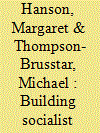

|
|
|
|
|
| Summary/Abstract |
Why do some attempts to use legal institutions to exert central state control fail, while others succeed? Through a controlled comparison of the Soviet Union (USSR) and the People’s Republic of China (PRC), we analyse the institutionalisation of the procuracy, an agency charged with enforcing central legal directives. We show that institutional design, competition, and political support during critical junctures created a positive feedback for the institutionalisation of the procuracy in the USSR but left it weak in China. These findings contribute to our understanding of institutional development, state-building, and authoritarian legal control.
|
|
|
|
|
|
|
|
|
|
|
|
|
|
|
|
| 2 |
ID:
169413
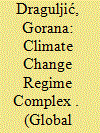

|
|
|
|
|
| Summary/Abstract |
In an era defined by forum shopping, institutional proliferation, and regime complexity, why do global governance arrangements remain relatively stable? This article combines the insights of regime complexity scholarship with historical institutionalism to address this question. It argues that the establishment of international regimes creates winners and losers. States dissatisfied with these arrangements push for institutional change. Regimes nonetheless tend to develop in a path-dependent manner because institutions are resistant to change and the winners under the status quo seek to protect it. Thus, existing governance arrangements exert a centripetal pull, even when states engage in forum shopping and institutional proliferation to generate regime complexity. An examination of path-dependent institutional development in the global climate regime supports the argument.
|
|
|
|
|
|
|
|
|
|
|
|
|
|
|
|
| 3 |
ID:
131892
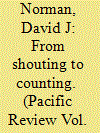

|
|
|
|
|
| Publication |
2014.
|
| Summary/Abstract |
This article explores the emergence of new spaces for civil society organisations (CSOs) as a result of an increasing interest by international donors in multi-stakeholder approaches to good governance under the 'new policy agenda'. Drawing upon a contemporary case study of civil society in Cambodia, it argues that CSOs have been encouraged to perform two key roles on a national level: professional service delivery agents and democratic watchdogs. Both roles are seen by donors as integral to supporting an accountable and professional model of the Cambodian state while drawing upon valuable private sector lessons in a synergetic model of governance. The result is the construction of particular neoliberal spaces for CSOs operating as technical implementation mechanisms in response to externally driven donor pressures. Furthermore, under this new framework of governance, CSOs face pressure to undergo internal transformation akin to new public management reform; embracing economistic and administrative modes of coordination as core values of civil society participation.
|
|
|
|
|
|
|
|
|
|
|
|
|
|
|
|
| 4 |
ID:
154800


|
|
|
|
|
| Publication |
Noida, HarperCollins Publishers, 2017.
|
| Description |
xvi, 325p.hbk
|
| Standard Number |
9789352770144
|
|
|
|
|
|
|
|
|
|
|
|
Copies: C:1/I:0,R:0,Q:0
Circulation
| Accession# | Call# | Current Location | Status | Policy | Location |
| 059162 | 330.954/RAJ 059162 | Main | On Shelf | General | |
|
|
|
|
| 5 |
ID:
158498
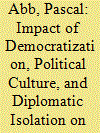

|
|
|
|
|
| Summary/Abstract |
Taiwan’s landscape of think tanks, despite having emerged during a time of Leninist one-party governance and state-led economic development not unlike that in Mainland China, is today marked by a substantial agency in conducting both research and advocacy. This sets them apart from their counterparts on the mainland. We ask how this development was shaped by Taiwan’s evolution as a political entity, especially its experience of gradual political liberalization and eventual full democratization by the mid-1990s. In its wake, multiparty competition, factionalism, the emergence of a vigorous civil society, and individual interest groups created an environment in which think-tank services were sought by many competing actors, offering a wide array of funding opportunities for policy research. Additionally, a political culture that stresses expertise and the need to conduct unofficial diplomacy often gave think tanks a privileged position within the system, and they served as key agents in conducting the kind of informal diplomacy made necessary by Taiwan’s loss of diplomatic recognition from the 1970s onwards.
We further offer an overview of Taiwan’s think-tank landscape, describing major groups (or types) of institutes and briefly portraying especially prominent cases within them. Finally, we provide two detailed case studies to show how these institutes operate in practice, and how the need for unofficial diplomacy and a recent government change have shaped their activities.
|
|
|
|
|
|
|
|
|
|
|
|
|
|
|
|
| 6 |
ID:
192497


|
|
|
|
|
| Summary/Abstract |
The article explores ways to ensure the internal consolidation of the BRICS
group, which is at a crucial stage of its development due to the sharply
changed geopolitical situation. It emphasizes that the issue of BRICS’
enlargement, which has taken central stage lately due to the desire of more
than two dozen states to join it, should not sideline the task of deepening
economic interaction within the group, structuring it further, and turning
it into a full-fledged economic cooperation organization.
|
|
|
|
|
|
|
|
|
|
|
|
|
|
|
|
| 7 |
ID:
171660


|
|
|
|
|
| Summary/Abstract |
Not only the United Nations, but the principal organs will also be celebrating their anniversary in 2020. This article explores how the UN Secretariat was run during the past 75 years. The institutional development of the secretariat of an international organization (IO) depends on the leadership displayed by the executive head and senior staff and on the political settings such as the constitutional leeway, the selection of its main functionaries, the conditions set for activities, and the allocation of resources. The better the secretariat is managed, the stronger the leadership capacity of the organization’s executive head will be; however, it may be questioned whether this same expectation regarding effective management can be applied to the UN. A handbook article about the UN Secretariat, written by competent insiders, is quite negative as it describes its existence as a lifelong “battle over its independent nature and an almost constant process of restructuring and reform,” with the reform issue being a recurrent theme in the media
|
|
|
|
|
|
|
|
|
|
|
|
|
|
|
|
| 8 |
ID:
086164
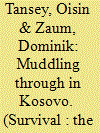

|
|
|
|
|
| Publication |
2009.
|
| Summary/Abstract |
Kosovo's unilateral declaration of independence of 17 February 2008 has made visible the deep divisions between the United States and its European allies on the one hand, and Russia on the other; divisions that shaped the political dynamics of the Kosovo crisis nine years ago as they do today. The failure to settle the status question through diplomacy has thrown the UN into crisis, leaving the Security Council deadlocked and the international community in Kosovo without direction and momentum. It has led to the de facto partition of Kosovo and control by Belgrade of the Serb-inhabited northern municipalities, and left the international community struggling to define the nature of its engagement. The political divisions that have heightened the problem in Kosovo over the last nine years are unlikely to be resolved soon and, if anything, recent developments have accentuated them. New and creative approaches to stabilising Kosovo and promoting its economic and institutional development are necessary. Current European Union projects in support of the peace process in Northern Ireland might offer a model for such engagement.
|
|
|
|
|
|
|
|
|
|
|
|
|
|
|
|
| 9 |
ID:
126632
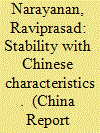

|
|
|
|
|
| Publication |
2013.
|
| Summary/Abstract |
Even as Xi Jinping begins to make his personal imprint on Cross-Strait relations, he has to contend with his predecessor, Hu Jintao's policy towards Taiwan that generated a modus vivendi, acting as a precursor to a slew of trade related agreements between the two sides leading to the ECFA in 2010. On Taiwan, the 'status quo' aspect of Cross-Strait relations has assumed overwhelming consensus with calls for deeper economic engagement with the mainland. Broadly, a template with its own characteristics emerges of a selective reconciling of differences with certain accommodations of interests making the Cross-Strait relations a unique model. This article situates Cross-Strait relations during Hu Jintao's term from 2002-2012, and advances the proposition that the mechanics of an eventual integration are underway with deeper economic cooperation being the first phase of a comprehensive framework under construction. To Beijing, its behaviour on Cross-Strait issues is intrinsic to its announced process of 'peaceful development'. However, the 'relative' success of the on-going process of economic integration does not have to be interpreted as an overwhelming endorsement of the methodology adopted, since closer relations with the mainland is a deeply divisive and politically charged issue in Taiwan
|
|
|
|
|
|
|
|
|
|
|
|
|
|
|
|
|
|
|
|
|